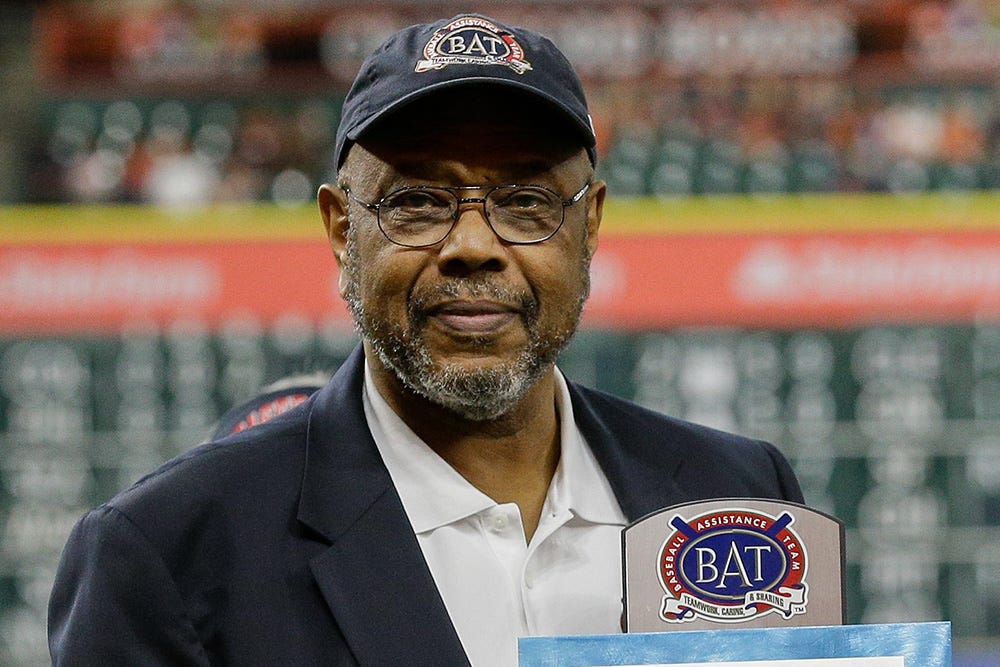No BS from this classic era "Bull"
Bob Watson grew up working class, played like it, and impacted the game for decades
Bob Watson was never the flashiest or loudest player in a clubhouse. But his teammates always knew he was there. Consistent, dependable, and quietly making history, Watson, nicknamed "The Bull" due to his stocky physique and strong bat, had an impact on baseball that stretched far beyond his playing career, breaking barriers in the front office and creating a long-lasting legacy.
Watson was born on April 10, 1946, in Los Angeles, and grew up in a working-class neighborhood where sports were commonplace. Watson, who was raised mostly by his grandparents, saw baseball as more than simply a game. It was a means of advancement. He played with future major leaguers Willie Crawford and Bobby Tolan at John C. Fremont High School, where he helped the club win the city championship in 1963.
Despite his talent, Watson was drafted to an MLB team out of Los Angeles Harbor College. The Houston Astros took a chance on him and signed him as a free agent in 1965. The journey ahead would not be easy.
Enduring,thriving despite racial bias in the minor leagues
The minor leagues served as a testing ground, but they were also a harsh environment for a Black player in the 1960s. Watson performed in the segregated South, where racism was an unavoidable reality. He faced discrimination at hotels, restaurants, and stadiums, but he never let it hinder him.
His innate hitting skill carried him through the ranks, but his position was unknown. Watson was originally a catcher, but his bat was too valuable to leave behind the plate. Before settling into first base, the Astros tried him out in the outfield. His breakout moment came in the early 1970s, when he established himself as one of baseball's most reliable hitters.
Watson spent the most of his 19-year major league career with Houston. He was a two-time All-Star and concluded his career with .295 batting average. Though never a superstar, he was the type of player that every team desired: dependable, tough, and professional.
One of his most notable moments came on May 4, 1975, when he scored Major League Baseball’s millionth run. It was an unusual milestone, but it was appropriate for a player whose consistent presence often went unnoticed.
Watson was a crucial senior presence for the Red Sox, Yankees, and Braves, hitting .318 in the 1981 World Series with New York, demonstrating his ability to perform on the biggest stage. He retired from baseball in 1984.
MLB’s first African-American GM
But his contributions to the sport continued. In 1988, he was appointed assistant general manager of the Houston Astros, breaking new ground for Black executives. In 1993, he was named general manager, making him the first African American to occupy that post in MLB history.
Two years later, the Yankees appointed him as their general manager. In 1996, he assembled a championship squad, becoming the first Black general manager to win the World Series. Though his time in New York was brief, the title solidified his status.
Watson continued to mold the game after leaving the GM position, working as MLB's vice president of discipline and on-field operations. He had a significant role in implementing league laws.
Illness, and the strength to battle through it
Watson was diagnosed with prostate cancer in 1994, and he fought it with the same tenacity that had defined his career. He became an ambassador for cancer awareness, encouraging men to get regular tests and sharing his own story to encourage others. He ultimately succumbed to kidney disease in 2020, leaving us way too soon at the age of 74.
Bob Watson was more than just a tremendous batter or a successful executive, he was a pioneer. He demonstrated that success in baseball is more than simply home runs and highlight reels. It is about consistency, perseverance, and breaking down obstacles. His quiet strength made history, and while he avoided the spotlight, his contribution will never be forgotten.



